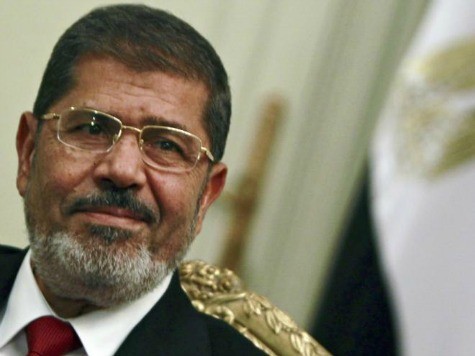
Is Egyptian President Mohamed Morsi a secular reformer or a religious hardliner? The answer to that question depends on the particular audience he is addressing.
Wednesday, Time magazine published an interview with Morsi, his first statement to the US media since his decree of autocratic power last week. Asked about his vision for Egypt moving forward, Morsi spoke “mostly in English” and assumed the tone of a secular reformer:
I’m very keen on having true freedom of expression. True freedom of faith. And free practice of religious faith… Egyptians are determined to [move] forward within the path of freedom and democracy, and this is what I see. Justice and social justice. Development with its comprehensive overall meaning. Human development. Industrial productive development. Scholarly research. Political development. International relations balanced with all different parties, east and west. We are keen in Egypt, and I am personally keen right now, on maintaining freedom, democracy, justice and social justice. The Muslim Brotherhood do not say anything different from that.
Religious freedom, human development, industry–all things one expects a modern head of state to be concerned about. However, one important item not mentioned in Morsi’s answer or anywhere in the Time interview is his view of Sharia law and its role in forming the new constitution of Egypt.
In the summer, when he was still candidate Morsi, he did have something to offer on this question. His speech in Arabic was translated by the Middle East Media Research Institute (MEMRI):
Mohamed Morsi: [in the 1920’s, the Egyptians] said: “The constitution is our Koran.” They wanted to show that the constitution is a great thing. But Imam [Hassan] Al-Banna, Allah’s mercy upon him, said to them: “No, the Koran is our constitution.”
The Koran was and will continue to be our constitution. The Koran will continue to be our constitution. The Koran is our constitution.
Crowds: The Koran is our constitution.
Mohamed Morsi: The Prophet Muhammad is our leader.
Crowds: The Prophet Muhammad is our leader.
Mohamed Morsi: Jihad is our path.
Crowds: Jihad is our path.
Mohamed Morsi: And death for the sake of Allah is our most lofty aspiration.
Crowds: And death for the sake of Allah is our most lofty aspiration.
Mohamed Morsi: Above all – Allah is our goal.
He goes on to say, “This nation will enjoy blessing and revival only through the Islamic shari’a.” What Morsi is saying here seems to be at odds, both in outline and in tone, with what he told Time.
The question is, which audience is getting the truth and which one is being told what it wants to hear? That question isn’t completely settled yet, though Morsi’s assumption of the powers of an autocrat are probably a strong hint which way he is actually leaning.

COMMENTS
Please let us know if you're having issues with commenting.